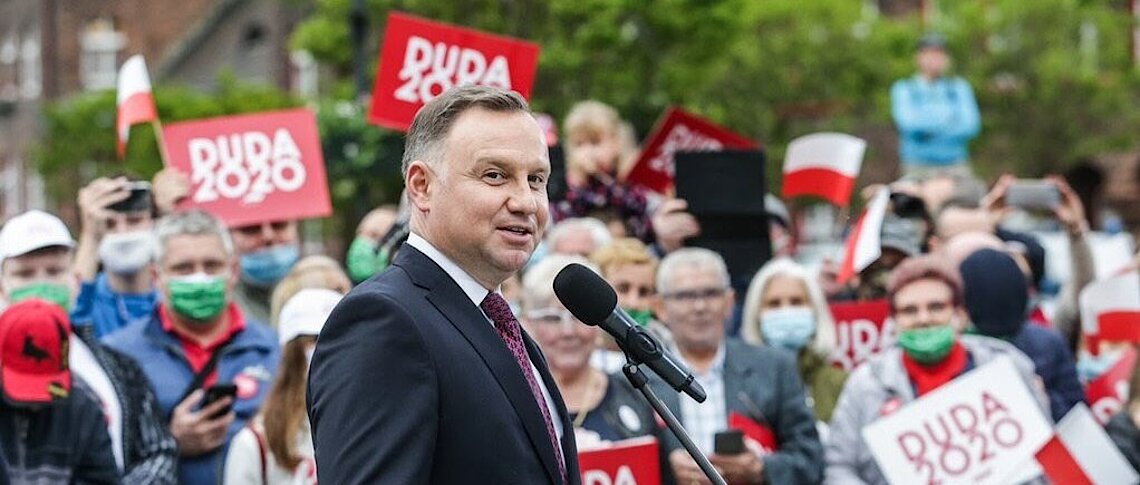The 13 November marked one hundred days of Polish president Andrzej Duda’s second term in office. Being the incumbent always comes with a sort of advantage but Andrzej Duda did not have it easy – and not only because of Covid-19.
There is a discrepancy between how he imagines his presidency and the expectations of the Polish government under the informal leadership of Jarosław Kaczyński, the chair of the Law and Justice (PiS) party. Duda’s presidency is therefore largely inconsistent – and the presidential palace has seldom been as vulnerable as today.
Although supported by the United Right, Duda has been trying to come across as politically independent and build a legacy of his own. Back in 2015, he launched his campaign around the promise of being an active president, as opposed to the sort of passive and at times clumsy style of his predecessor, Bronisław Komorowski (PO). Duda also vowed not to blindly follow his political family. Has he remained true to his promise?
One leader in the room
In the Polish political system, the role of a president is quite significant: he heads the executive branch and therefore can block certain government actions, e.g. through a presidential veto. Andrzej Duda has so far used this right nine times.
Two of these decisions were particularly significant. In 2017, Duda rejected the reforms of the Supreme Court and the National Council of the Judiciary, amidst a dramatic conflict with the European Commission over the independence of Polish judiciary that additionally had ignited mass protests in the country. This brought him into a disagreement with Zbigniew Ziobro, the Minister of Justice and leader of the junior coalition partner of PiS.
It’s clear that Duda’s re-election was neither a result of charisma nor powerful political leverage but an outcome of sheer determination to petrify PiS’ hegemony in Poland.
Before that, Duda had also been in conflict with another PiS persona, Antoni Macierewicz, a former Minister of Defence and a vocal proponent of the controversial assassination theory around the 2010 Smoleńsk catastrophe. Duda had not accepted staffing recommendations for the National Security Office by the Presidential Palace, which led to some retaliatory actions fuelled by Macierewicz’ bruised ego.
Nevertheless, these attempts were bound to clash with how Kaczynski envisaged the role of a president. To many observers, Duda seemed too independent and that demanded a corrective conversation in October 2017. It was clear that no inner pluralism was acceptable within the PiS party and that the United Right coalition only had one leader. In Duda’s case, it’s not possible to dismiss him from office. But he can still be ostracised by his political family.
Maneuvering around an iceberg
It’s clear that Duda’s re-election was neither a result of charisma nor powerful political leverage but an outcome of sheer determination to petrify PiS’ hegemony in Poland. The United Right coalition, and in particular the leading PiS, went great lengths to mobilize their electorate and this comes at a certain price for Duda.
After his last rebellious decisions two years ago, Duda has meanwhile accepted a highly controversial act on public media, streaming the outrageous sum of 2 billion to public TV, minutes before COVID-19 broke out in Poland. He also fully internalised the militant and scapegoating rhetoric of the United Right in his campaign. Some experts also suggest his former vetoes were a mere game with PiS voters and tactically blocked only the acts that Kaczynski did not want to proceed in the Parliament.
However, the official statements of Kaczynski confirmed his disappointment with Duda’s past conduct. In fact, till today Kaczynski is not fully fond of Duda and he lets him feel it. In July, he arrived late to the inauguration of the second term, interrupting the celebration and then left immediately after. Early in October, he did not stay for a ‘family photo’ after the President had appointed a new cabinet, featuring Kaczynski as vice-Prime Minister.
Finally, during the recent outbreak of the so-called Back Protests contesting further restrictions in access to abortion, Kaczyński addressed the nation in a video message. To be fair: Andrzej Duda tested positively for coronavirus and remained in isolation which coincided with the mass protests. Nevertheless, both he and the First Lady remained silent in those turbulent days. Only more than a week after the protests had broken out, the President spoke, announcing his will to initiate a legislative process on a new act on abortion.
Today, Duda has to make a calculation: remain a loyal team player of the United Right and let Jarosław Kaczyński effectively lead the country, or dare to build his own court within the United Right?
Perhaps he was trying to become a consoling voice, especially when protests continued despite the second wave of Covid-19 approaching. But one cannot help the feeling that he was just acting as a patch to fix the unappealable ruling of the Constitutional Court, controlled by the Law and Justice loyalists. In the end, his proposal has neither won the recognition of protesters nor met the expectations of the pro-life movement, whose leader called the president a ‘political traitor’. Duda’s dream to be a ‘President of all Poles’ failed again.
A statesman or ‘the pen’?
One hundred days of Andrzej Duda’s second term have passed. No-one questions that assuming the presidential office in times of both coronavirus, as well as an unprecedented turmoil in the country, isn’t easy. Nevertheless, Andrzej Duda’s challenge reaches beyond these immediate circumstances: he will have to counter Kaczynski’s attempts to subordinate him, also in his very own personal interest: to be remembered as a statesman, not a mere puppet.
While launching his first presidential campaign in 2015, Andrzej Duda was sarcastically calling his predecessor, Bronisław Komorowski, ‘a guard of chandeliers in the Presidential Palace’. Meanwhile, not long into his first term, he earned a particular nickname among his opponents, ‘the pen’, hinting at his loyalty towards the United Right coalition, best manifested by more than 1000 bills signed into law, including the blatantly unconstitutional ones. His ambitions to be a great statesman clash with a reality check of his power base.
Today, Duda has to make a calculation: remain a loyal team player of the United Right and let Jarosław Kaczyński effectively lead the country, or dare to build his own base within the United Right? If he chooses to liberate himself, he will surely lose the support of the biggest political party in Poland, but also won’t sink together with the government – if worse comes to worst. He is facing a choice between a golden cage and a great unknown, an optimist would say. A pessimist would perhaps put it as a choice between pest and cholera, because no-one wants to wage a war with Jarosław Kaczyński. But regardless of which perspective one takes, one thing is for sure: Duda’s second term will be a character test he cannot fail. History is always written by the winners.






